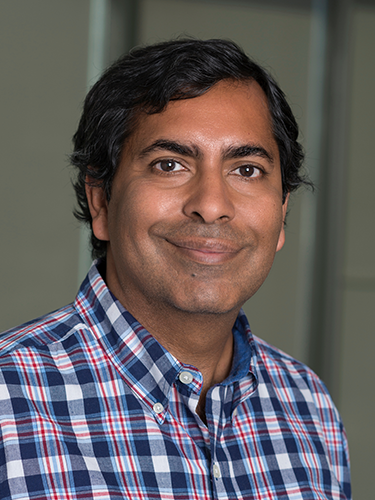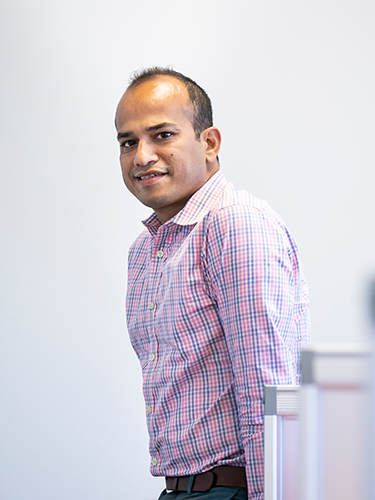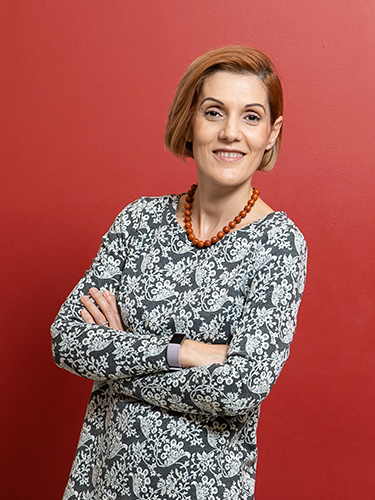
Sanjeev Setia, professor and associate dean for computing programs and initiatives for the Volgenau School of Engineering, says the Department of Computer Science is expanding its depth and reach to provide a diverse array of programs and courses in computing to students from all backgrounds and at all levels. Photo by Creative Services
Computing devices permeate all areas of our lives, and computational methods are used in almost every field ranging from the arts and humanities to the sciences and engineering.
Given the importance of computing in today's world, Mason Engineering’s Department of Computer Science (CS) has expanded its depth and reach and is well-positioned to help more students develop expertise in computer science and computing to meet the needs of industry.
“Our goal is to provide a diverse array of programs and courses in computing to students from all backgrounds and at all levels,” says Sanjeev Setia, professor and associate dean for computing programs and initiatives for the Volgenau School of Engineering.
A changing landscape
During the past two years, key developments have created seismic shifts in the computer science landscape of Northern Virginia. The first came when Virginia’s Crystal City won the bid to become the location for Amazon’s HQ2 in 2018. This announcement was coupled with a commitment from the Commonwealth to create more than 25,000 high-paying jobs by 2030.
To meet the needs of Amazon as well as thousands of other Virginia employers constantly searching for world-class computing talent, Virginia Governor Ralph Northam also announced the Commonwealth would invest $750 million to grow Virginia’s tech talent pipeline and to diversify its innovation economy.
This 20-year initiative—the Tech Talent Investment Program (TTIP)—seeks to increase the number of Virginia graduates from computer science, computer engineering, and software engineering programs at both the undergraduate and master’s levels.
Computer science programs continue to be robust with growth increasing by 86 percent over the 2015-2019 period. With new TTIP investments in faculty and student success, the university is confident that it can meet its TTIP commitment to prepare 8,410 graduates over the 20-year period largely from the computer science program.
In 2020, the Department of Computer Science enrolled about 2,000 students, making it one of the largest at VSE and at the university.
The university’s draft report on the School of Computing from April 2020 states, “It is within this dynamic environment that Mason will launch its new School of Computing (SoC). Informed by the increasingly pervasive role of computing in society and leveraging TTIP investments from the commonwealth, the university has an unprecedented opportunity to play a leadership role in shaping the future of computing regionally, nationally and globally while also enhancing economic prosperity and the quality of life for residents in the region and beyond.”
Size, numbers, and financial investment matter, but what is even more important is the partnership and vision for computing that a unified school provides. Although the Departments of Computer Science, Information Sciences and Technology, and Statistics will form the core of the School of Computing, the school will strive to enrich computing programs and collaborations across campus in all disciplines.

Huzefa Rangwala, current chair of the Department of Computer Science, envisions that new innovative computer science courses and program offerings will cater to students across disciplines. Photo by Ron Aira.
Huzefa Rangwala, current chair of CS, envisions that new innovative courses and program offerings would be catered to students across disciplines who are interested in computing broadly and the career opportunities it presents. Creating an inclusive and diverse computing workforce is one of the top priorities for the faculty in computing, he says.
Leadership and growth
To prepare for increased enrollment, the department recruited 13 new faculty for full-time positions beginning in August 2020. This brings the total to 50 tenured and tenure-track faculty members, 11 teaching and research faculty, and 500 graduate students, including 200 PhD students.
Incoming chair David Rosenblum, who will take the helm of the department in August 2020, says he is looking forward to returning to the United States after a 16-year absence.
Rosenblum completed his education in the United States, including earning his PhD from Stanford, and he started his career here before moving overseas. He has worked both in industry and in academic institutions on three continents—the University of California Irvine, University College London, and National University of Singapore.
Rosenblum says, “I am thrilled to be joining the Computer Science Department at Mason. I’m greatly impressed by the department’s highly cohesive and collaborative spirit and by its clear ambition to realize the potential that modern-day computing offers to the full range of academic disciplines and industry sectors. The department is ready to become a significant partner with many of the units on the Mason campuses in major research and educational initiatives.
“Our faculty's excellence is reflected in the list of awards including 14 CAREER/Young Investigator awards, seven Mason Emerging Researcher awards, and eleven Mason Excellence in Teaching awards,” Rangwala says.
For instance, professor Jeff Offutt, who received an outstanding teaching award from the university joins his colleague Danny Menasce in earning the state-wide award for faculty excellence. Menasce who earned the award in 2017 says, “Most importantly, what I try to do with my students is tell them they need to learn how to learn.”
Offutt agrees that life-long learning is crucial, and he is constantly adapting to changing technology and helping students become resilient.
Offutt and Menasce have been with the department for many years, but relative newcomer Jonathan Katz sees a tremendous opportunity for computer science in Northern Virginia and at Mason. Katz was hired in 2019 as professor and Eminent Scholar in Cybersecurity and brings impressive credentials and a strong background in cryptology to the department.
He is a recipient of a Humboldt Research Award, and he was recently named an International Association for Cryptologic Research Fellow in recognition of "his broad contributions, especially in public-key encryption and cryptographic protocols, and for dedication to service and education."
Katz says that he is excited by the possibilities opened up by the recently announced School of Computing at Mason, as well as the new cybersecurity department within the engineering school.
Research budget continuing to expand
The Computer Science Department’s annual research expenditures where faculty are either principal investigators or co-principal investigators doubled between 2016 and 2019, rising from $7 million to $14.1 million.
Faculty members have expertise in a wide array of fields including artificial intelligence, algorithms, computational biology, computer graphics, computer vision, cryptography, databases, data mining, parallel and distributed systems, real-time systems, robotics, security, software engineering, and wireless and mobile computing.
Craig Yu, an assistant professor in the department, recently received a prestigious CAREER Award, which recognizes early-career researchers, from the National Science Foundation. Yu is developing a computational design framework that companies can use to develop customized virtual reality programs for headsets more easily and efficiently, which would lower costs.
His research on virtual reality is groundbreaking, Rangwala says. “He is one of the new leaders in the field, and his passion for making this technology available to everyone is exciting for everyone at the university, especially our students.”
Likewise, Eric Osterweil, an assistant professor of computer science, is breaking new ground with his research on creating a more secure, stable infrastructure for the Internet. He spent almost 20 years working in industry, operations, standards, and policy communities to gain insights into cybersecurity. But now, he’s glad to be “with Mason’s talented researchers who have a great reputation in the computer science and cybersecurity communities.”
One of the benefits of being part of an R1 university involves the ability to cross departmental and disciplinary boundaries. CS faculty are actively engaged in inter-disciplinary research collaborations with colleagues from all over campus and other universities. Their efforts include partnerships with data scientists, bioengineers, political scientists, and earth scientists.
“Inter-disciplinary collaboration in research and education is a key component of the department's vision and strategic plan for the future,” says Setia.

Amarda Shehu, a professor of computer science, is one of the leaders of Mason’s new Center for Advancing Human-Machine Partnership, which is an effort to rethink human-machine partnerships and to design technology in a way that puts people in control. Photo by Ron Aira.
For example, Amarda Shehu, a professor of computer science, is one of the leaders of Mason’s new Center for Advancing Human-Machine Partnership.
The purpose of the center is to rethink human-machine partnerships and to design technology in a way that puts people in control, Shehu says.
The interdisciplinary team includes faculty members from six colleges, including VSE, the College of Education and Human Development, the College of Humanities and Social Sciences, the College of Science, the College of Visual and Performing Arts, and the Schar School of Policy and Government.
The payoff with computer science degrees
Graduates of the program find jobs not only in the technology sector of the economy but also in higher education, financial services, and as entrepreneurs.
Notable alumni from the department include Ronald Ritchey, managing director of JP Morgan Chase & Co.; Peng Ning, director of engineering at Google; and M. Brian Blake, provost at The George Washington University, and Abdur Chowdhury, an entrepreneur and former chief scientist of Twitter.
Computer science alumni live and work all over the world, but many live in the greater metropolitan area of Washington, D.C. The department has an active external advisory board composed of respected leaders in industry and government from a wide spectrum of organizations.
The members provide the department with critical guidance and feedback so that our courses and programs reflect the state of the art in computing technology. The board plays a fundamental role in assisting the department in its goal of graduating students who are well prepared to meet the workforce needs of the commonwealth and the nation.
Putting it all together
As CS begins its next chapter by welcoming a new department chair, new faculty, and returning students the growth and accomplishments of the department point toward continued success.
“We have world-class faculty members with research strengths in almost all areas of computing, and a strong commitment to teaching,” Rangwala says.
Contributing: Nanci Hellmich
